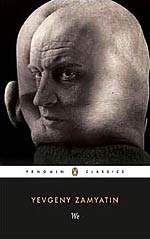
![]() llLeoll
llLeoll
4/11/2013
![]()
I am not quite sure why, but I found Zamyatin's We, considered by many to be a classic of dytopian literature, profoundly disappointing. The narrative is poorly structured, and it traces the protagonist's - the mathematician D-503 - descent into madness.
This sort of descent usually appeals to me. But here, Zamyatin leaves me cold. I never quite felt that the catalyst for D-503's madness, his love for I-330, was anything but staged. There was, it seemed, little there. And yet, this affection was supposed to instigate a "madness," which we know is love, that caused D-503's world to implode, making him unfit to exist in the perfect society, One State.
Not only is the book psychologically awkward to me, the world Zamyatin builds is filled with contradictions that, frankly, seem implausible. For instance, all citizens of One State live and work in transparent buildings, making it easier for authorities to spy on them. And yet, this state, obsessed by control, leaves the Ancient House, the sole opaque house on One State, untouched. And them allows their citizens to enter and exit said house at will. To further complicate things, Ancient House has assorted passages that, somehow, the authorities have never discovered.
Talk about your implausibilities.
And Zamyatin's style also leaves a lot to be desired. His interweaving fact and fantasy in D-503's mind seems clumsy. As does his contact with a group of free people living close to nature existing right outside the walls of One State - yet another implausibility.
There also seem to be a Romantic hint of Rousseau's "Nobel Savage" at work here. And the 19th Century's belief that rationality is flawed. And the only freedom a human can gain is by destroying rationality (One State). And replacing it with a naturalistic Utopia, where people live close to the land. Without realizing that One State is not a rational state, but a regressive state that nears theocracy in it's commitment to emotionless perfection.
Sad to say, I cannot recommend this book. Which sucks, because I was really looking forward to reading it. And found it blah. I found the stream of consciousness bits ham-handed - adopting a technique wiht little feee ofr its applications. And it's genre-required political rebellion a bit prosaic.
Leo Walsh is a writer, currently living in Cleveland, Ohio. For more from Leo, check Leo's Blog at leo-walsh.com.